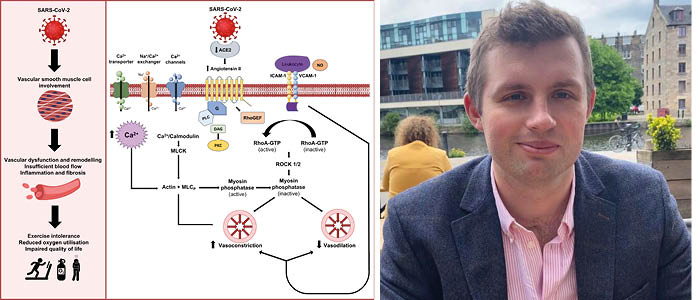New Paper Led by Robert Sykes
Published: 25 May 2023
Robert Sykes has had an article recently published
Vascular mechanisms of post-COVID-19 conditions: Rho-kinase is a novel target for therapy

Summary
Our research involved patients who had previously been hospitalised due to COVID-19 and used a comprehensive array of testing methods, including blood biomarkers, cardiorenal and pulmonary imaging, and gluteal subcutaneous biopsy. Resistance arteries from these patients demonstrated increased constriction and reduced endothelium-independent vasorelaxation compared to a control group, changes that were mitigated by a RhoA/Rho-kinase inhibitor, fasudil hydrochloride.
Histopathological examination revealed increased collagen in the arteries of the COVID-19 patients, indicating enhanced fibrosis. Furthermore, these patients showed greater phosphorylated myosin light chain antibody-positive staining in their vascular smooth muscle cells. This phosphorylation is a crucial step in the contraction of these cells and its upregulation could contribute to the observed increased vasoconstriction. The Rho-kinase pathway, involved in maintaining this phosphorylation state and thereby promoting contraction, appears to be activated in these patients, as indicated by the beneficial effect of the Rho-kinase inhibitor fasudil.
In an exploratory analysis using NanoString GeoMx technology in collaboration with Nigel Jamieson's lab, we identified up-regulated gene pathways related to extracellular matrix alterations, proteoglycan synthesis, and viral mRNA replication, indicating cellular and molecular changes in the vascular tissues of these patients.
This research found that patients with post-COVID-19 conditions exhibit enhanced vascular fibrosis and myosin light chain phosphorylation, which are likely contributing to the observed endothelial-independent vascular dysfunction. Our findings suggest that Rho-kinase activation is a potential therapeutic target for managing vascular dysfunction in long COVID.
First published: 25 May 2023

